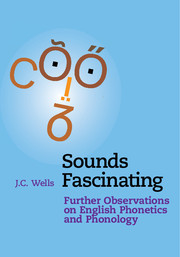3 - Interesting Words
from PART I - WORDS, NAMES, PEOPLE, AND PLACES
Published online by Cambridge University Press: 05 September 2016
Summary
Obstruent
A correspondent asked about the place of the main stress in the word obstruent, the phonetic cover term for plosives, fricatives, and affricates. He had a colleague who pronounced it with stress on the penultimate, thus əbˈstruːənt. I share his surprise. I have never heard anything but initial stress for this word, thus ˈɒbstruənt.
All other English words ending in -uent have antepenultimate stress for most speakers: affluent, effluent, congruent, constituent. However, some Americans do say conˈgruent with penultimate stress, and a few do the same with affluent and effluent, But I don't think anyone ever says constiˈtuent.
Words with other vowel stems plus -ant or -ent include brilliant, radiant, valiant, variant, gradient, lenient, prurient. They all have initial stress. On the other hand compliant and defiant have penultimate stress, no doubt because of the final-stressed verbs comply and defy.
A word I don't think I've ever encountered outside early nineteenth century poetry is reboant ‘resounding, echoing’. The OED used to give it initial stress, but now, in the third edition, 2009, opts for penultimate-stressed rɪˈbəʊənt. I've never heard this word actually spoken.
Rowlocking Fun
What is the AmE pron of rowlock? In a sense there isn't one, because the Americans call the object in question an oarlock.
In BrE, where we do use the word rowlock, those who are familiar with rowing and oarsmanship call it a ˈrɒlək (or possibly ˈrʌlək). Those who are not may instead use a spelling pronunciation ˈrəʊlɒk (compare forehead, where the spelling pronunciation has by now largely displaced the traditional ˈfɒrɪd).
One might assume that any American who actually needs to use the British term would use a BrE-style pronunciation. In a trivial way, the same sort of question arises if we ask what the BrE pronunciation of rowboat is. In a sense there isn't one, because in BrE a boat you can row is called not a rowboat but a rowing boat.
But we have to draw a line somewhere: no one wants to say that in AmE trousers is pronounced pænts. Nor is a lift to carry you up a building pronounced ˈɛləveɪdɚ.
- Type
- Chapter
- Information
- Sounds FascinatingFurther Observations on English Phonetics and Phonology, pp. 16 - 30Publisher: Cambridge University PressPrint publication year: 2016

